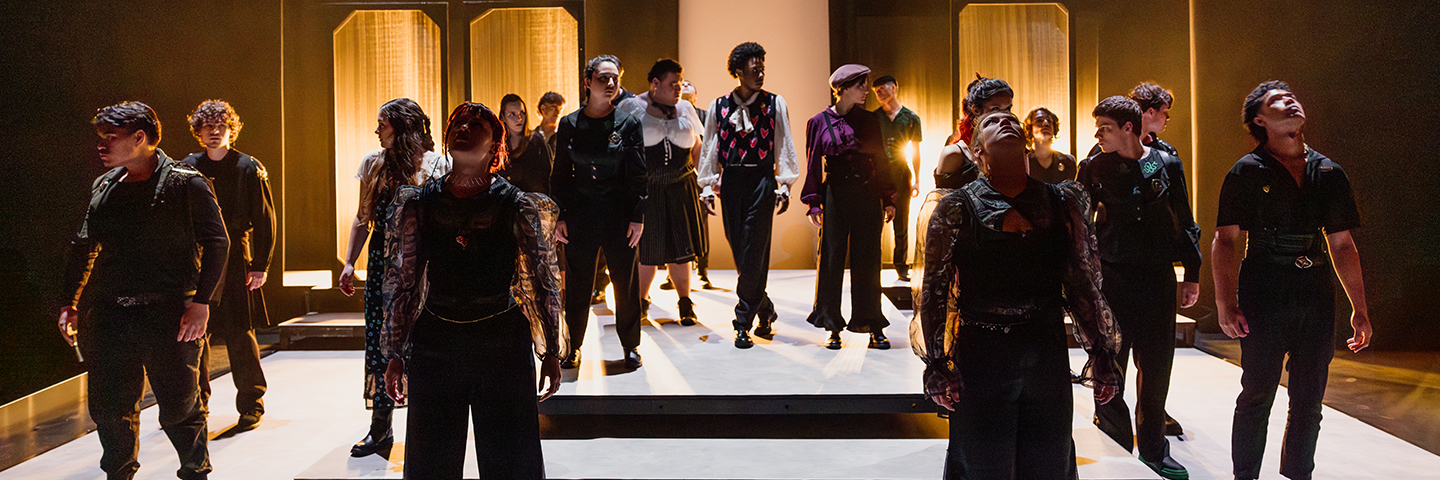Programme overview
Working in an environment that is framed by the values of our Te Noho Kotahitanga partnership, you will learn practical and professional skills in an environment of wrap around support.
Throughout the three years of training, you will be challenged to strengthen your capacity for expression in your body and voice, while working to deepen your understanding of character. You will also build the professional skills you need, not only to get jobs and make your own work, but make ends meet as a working artist.
Highlights
- Numerous opportunities for live and screen performance.
- A vibrant collaborative environment that includes dance, screen arts, design and contemporary arts.
- Close links to the live performance and screen industry
- 30 years training experience with a rich history of successful graduates, many of whom are now influencers and leaders in the industry.
- Masterclasses, workshops and projects led by local and international practitioners
- Strong international connections.
- Pathway to Postgraduate Diploma in Creative Practice or Master of Creative Practice.
Programme Structure
Year One: Begin to develop core skills in voice, movement, singing, and acting for screen and stage. Apply new skills in scene work and collaborations with screen students. Dive into Mātauranga Māori and Māori performing arts, as you start to discover who you are as an artist.
Year Two: Deepen your skills in acting, voice, and movement. Perform publicly and collaborate with other students on screen and live performance projects. Work on specialized skills including accents and audition technique. Expand your knowledge of the industry and how to operate as a professional actor. Explore other creative practices through electives including writing for comedy, hybrid art, and more.
Year Three: Apply your learning in master classes, scripted live performance, screen work, and devised theatre while engaging in industry secondments and professional skills development. Work towards entering the industry with excellent relationships, skills, and professional practices.
Auditions
Each year we have a large number of applicants for the 24 places offered in Year One.
If you’re not sure that you’re ready to audition for this highly competitive programme yet, please look at the New Zealand Certificate in Study and Career Preparation (Level 4) – Screen Arts, Acting and Technical Production, which is a semester-long (full-time) programme designed to help upskill students who are interested in progressing to the degree.
Auditions
To join Unitec’s Bachelor of Performing and Screen Arts (Acting for Screen and Theatre), you’ll need to audition.
The first round of auditions will be submitted via video by Friday, 12th September 2025.
Successful candidates will be invited to attend the second round of auditions, which will be held in-person over a 2-day weekend in Auckland on Saturday 4th (9 AM to 4 PM) & Sunday 5th October (9 AM to 3 PM) 2025.
Industry connections
Our core teaching staff are working professionals with live performance and screen credits that include dozens of local and international productions.
We maintain close contact with the industry through our lecturers, graduates, guest tutors, and directors, and continuously adapt our acting programme to meet industry changes.
Guest tutors lead students in stage and screen projects, along with specialist workshops in everything from screen performance to devising to essential business skills.
This is by far the most industry-connected acting programme in New Zealand.
Facilities
Unitec stands at the forefront of acting training in New Zealand, offering extensive training, opportunities for multi-disciplinary and collaborative practice, and close proximity to Aotearoa’s major theatre companies and studios.
With a film school on site, acting students have regular opportunities to collaborate closely with future colleagues— designers, producers, writers, dancers, directors, editors, and sound, lighting, and camera professionals. The campus features a range of spaces for live and screen performance, including acting studios, and an onsite film studio.
All first and second year students at Unitec receive all their instruction at our Mt Albert Campus in a brand new, purpose-built creative arts hub. We also partner with TAPAC (The Auckland Performing Arts Centre) just down the road to host our third-year cohort.
Admission requirements
What you will need to study this programme.
Domestic students
International students
Academic requirements
As a part of this requirement, you must be at least 16 years of age and meet one of the country-specific admission requirement;
And meet English entry requirements;
If English is not your first language, you will also need at least one of the following qualifications:
- Evidence of an IELTS (Academic) band score of at least 6 with no band score lower than 5.5
- University Entrance Literacy: 8 credits at Level 2 or above in English or Māori (4 in Reading, 4 in Writing); or
- Evidence of English language proficiency as outlined in the NZQA Rules on the Unitec English Language Requirements for International Students Web-page.
Don’t meet these Academic requirements?
- If you don’t meet the academic criteria, our Bridging Education Programmes can help you qualify. Simply apply online, and we’ll discuss your next steps.
- If you don’t meet the above criteria, special or discretionary admission may apply (PDF, 731KB) ; your eligibility will be determined at the interview.
Non-academic requirements
- Complete a medical declaration form.
- Interviews, submissions, and/or auditions will be required – we’ll notify you of what is required.
For more information, download the programme regulations (PDF 731 KB)
Courses and timetables
For more details on the courses including timetables, please click on the course names below.
Debug
| Courses | Credits | Aim |
|---|---|---|
| Acting Studio 1A(PASA5211) | 15.0 credits (0.125 EFTS) | To enable students to work collaboratively with those involved in the creative process of screen and theatre. The course focuses on collaboration and establishing the disciplines and methodologies for actor training in a hands on environment. |
| Acting Studio 1B(PASA5214) | 30.0 credits (0.250 EFTS) | To enable students to employ fundamental acting theories, concepts and techniques in practice based settings The course focuses on developing professional self-management approaches for through experiential exploration of the creative process practice as well as developing the student’s ability to identify personal areas of their own creative development. |
| Acting Techniques 1A(PASA5215) | 15.0 credits (0.125 EFTS) | To enable students to gain an understanding of fundamental theories, concepts and techniques of acting for theatre and screen. The course focuses on building capability for the actors instrument in voice and movement. |
| Acting Techniques 1B(PASA5218) | 15.0 credits (0.125 EFTS) | To enable students to acquire a wide range of basic skills, knowledge and practices for acting and to identify personal areas of creative development. The focus of this course is to enable students to continue to develop their capability in voice and movement. |
| Professional Development 1(PASA5902) | 15.0 credits (0.125 EFTS) | To introduce students to the basic professional practices associated with the performing and screen arts industries and their own professional development. This course focuses on building capability for students in self-management, communication and presentation, as well as academic literacies such as text analysis and academic writing. |
| History of Theatre(PASA5911) | 15.0 credits (0.125 EFTS) | To enable students to examine and reflect upon the historical development of theatre languages and theories in an interactive multi-disciplinary learning environment. This course focuses on placing selected movements and developments of production and performance in the context of the student’s specialist discipline. There is a focus on experiencing professional art making in the community through field trips and site visits. |

